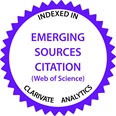Tytuł
Potencjał współpracy w nowo powstających inicjatywach klastrowych – analiza w sektorze turystycznym
Keywords
sieci współpracy, kooperacja, klastry, sektor MSP, turystyka, networking, cooperation, clusters, SME sector, tourism
Słowa kluczowe
sieci współpracy, kooperacja, klastry, sektor MSP, turystyka
Abstract
The aim of this paper is to identify a potential of cooperation between enterprises in the newly established initiatives and an adequacy to use the cluster concept to manage networks in the tourism sector. Authors presented in-deep literature review and outcomes of their own investigation of cluster initiatives. From the perspective of the cluster taxonomy, the tested initiatives should be described as policy-driven Marshallian industrial clusters at the early stages of development. Relationships between the participants are based on the so-called “networks of dialogue” and “networks of friends”. At this stage, they do not show features of “action networks” that are inscribed in the definition of clusters. At the initial phase of network development, the cluster members articulate the need for coordination of activities in the sector, however initiatives present a various level of preparedness to take charge of the organizational and financial responsibility for initiative’s actions. This suggests that the theoretical concept of clusters cannot be translated easily into the functioning of local cluster initiatives in the tourism sector. So, the conclusions of the study may be a starting point for the design and differentiation of cluster support tools.
Abstrakt
Celem artykułu jest identyfikacja potencjału współpracy przedsiębiorstw w nowo tworzonych inicjatywach i ocena zasadności wykorzystania koncepcji klastrów do zarządzania powiązaniami sieciowymi w sektorze turystycznym. W publikacji autorzy zaprezentowali pogłębione studium literatury przedmiotu oraz wyniki badań własnych inicjatyw klastrowych. Z perspektywy taksonomii obie badane inicjatywy zaliczyć należałoby do klastrów sterowanych typu marszalowskiego w początkowej fazie rozwoju. Powiązania między uczestnikami bazują na „sieciach rozmów/dialogu” i „sieciach znajomych”. Na obecnym etapie nie wykazują one cech „sieci działania”, które wpisane są w definicję klastrów. We wstępnej fazie rozwoju członkowie powiązania sieciowego artykułują potrzebę koordynacji działań w sektorze, jakkolwiek zróżnicowany jest ich poziom gotowości do przyjęcia organizacyjnej i finansowej odpowiedzialności za działania inicjatywy. Sugeruje to, iż teoretyczna koncepcja klastrów nie przekłada się w prosty sposób na funkcjonowanie lokalnych inicjatyw klastrowych w sektorze turystycznym. Wnioski z badania mogą stanowić punkt wyjścia do projektowania i różnicowania narzędzi wsparcia klastrów.
Recommended Citation
Badowska, S., & Golec, A. (2015). Potential of cooperation in newly formed cluster initiatives – evidence from the tourism sector. Problemy Zarządzania, 13(50), 147-165. https://doi.org/10.7172/1644-9584.50.9
First Page
147
Last Page
165
Page Count
18
DOI
10.7172/1644-9584.50.9
Publisher
University of Warsaw







